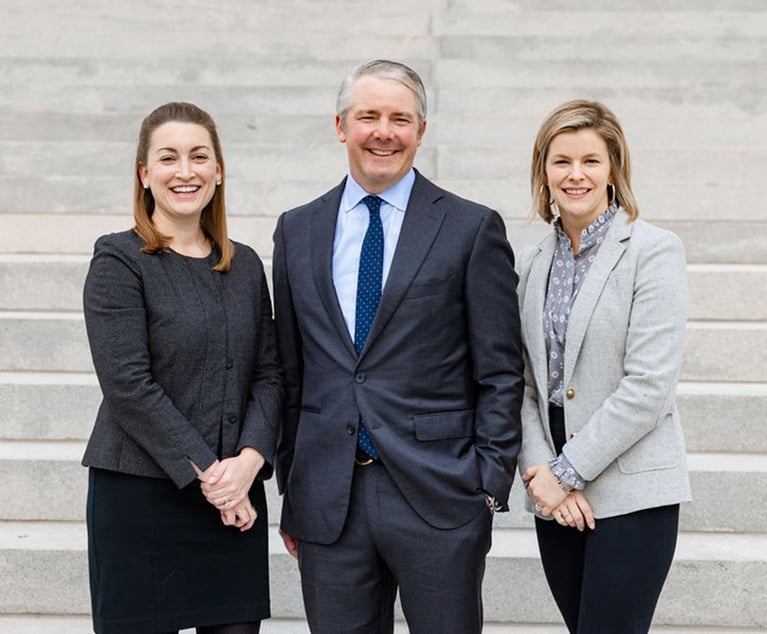Innovation Everywhere: How We Are Changing the Legal Market
Law firms need to see innovation as more than hardware and software. Change should be encouraged everywhere if firms are going to meet the challenges created by a rapidly evolving legal market.
October 23, 2019 at 02:30 PM
6 minute read

The fax machine, pagers and disposable cameras. All were once innovative marvels, but today they are mostly discussed with wonder as you explain to children that they ever existed. The pace of change in the legal market is also nothing short of spectacular, despite our industry's reputation for sticking to "tradition." But while technology is undoubtedly a significant driver, many seem to be overlooking the rest of the innovation story.
All law firms should expect their people to drive new ideas into everyday business and they should encourage creative thinking throughout their organizations and with their clients. They should also increasingly look at innovation as being tied to their clients and their talent.
|Client-Driven: Collaboration and Co-Creation
The days of law firms dictating strategy are long past. Clients are telling firms that they increasingly want to be involved in a collaborative effort; they want to be part of the process and the value creation.
It's important to develop collaborative approaches with clients that can be replicated across multiple practices and industry sectors (here at Hogan Lovells our focus on the latter is one of our strongest peer group distinguishers). Collaborative projects can be a great testing ground to find what works and what doesn't, improving decision-making and building solid relationships. Collaborative projects also allow for a bit more trial-and-error or "road testing" of new ideas than traditional matter approaches.
Some of this collaboration includes working with technology providers, taking their "off the shelf" products and adding bespoke functionality. For example, we launched a partnership with Cognia Law that will revolutionize our alternative legal services delivery solutions, and we developed AI and machine learning tools by adapting "off the shelf" software that can identify Chinese, Korean and Japanese character-based scripts, drastically reducing the time and cost of major investigations. We are not alone in taking this approach, and firms should be doing more of it.
|Talent-Driven: Diversity and Inclusion
Diversity and inclusion is fundamental to innovation. Clients from all industries increasingly expect that any legal team working with them will be diverse and inclusive, reflecting the diversity of their own customers and business objectives.
In the last year, we achieved Mansfield 2.0 certification. This is exactly the sort of yardstick that more firms should actively pursue. Mansfield measures commitment to tracking and increasing the composition of women, minority and LGBT+ candidates for lateral hiring, senior leadership positions and key business development activities. Once we obtained 2.0 certification we became one of five firms to do more intensive tracking during the Mansfield 3.0 process to shed light on what's happening with individual diversity strands. Additional efforts, such as our national diversity committee that is developing the pipeline of minority, women and LGBT+ leaders, should be an industrywide priority.
There are many other ways to continue innovating on diversity and inclusion—for example, several firms including Hogan Lovells have introduced formal gender transitioning policies and support networks for LGBT+ colleagues and allies. And for firms with a global presence, it's crucial to extend support networks to countries where LGBT+ colleagues may suffer discrimination and intolerance from local cultures.
|Client-Driven: Looking Beyond Legal Services
Law firms must innovate to address clients' real-world problems in creative ways. By having conversations with clients, it's possible to create valuable add-on services that address needs and build broader relationships.
For example, we launched consulting practices in strategic communications, cyber risk services, transfer pricing, and financial services regulatory consulting to supplement many of the legal matters we are advising clients on. For instance, our FSRC team recently collaborated with our legal team to guide the launch of a major Wall Street investment firm's first online retail savings bank in Europe.
|Talent-Driven: Mental Health in the Legal Profession
For many years, there was a great reluctance to accept that mental health in the legal profession was even a problem. When we first launched an in-house counseling service, "Ask George," in our Washington, D.C., office several years ago, one prominent legal sophist even felt strongly enough to suggest that his firm's clients wouldn't want lawyers who admit to having problems. That has not been our experience.
The legal profession is still, and likely will always be, no place for the faint of heart. But it takes leadership and innovation to admit that it is human to struggle and we are all facing challenges in our lives. Improving mental health can extend careers, positively impacts life outside of the office, and with some investment, is within reach of all law firms.
|Talent-Driven: Pro Bono and Community Investment
We celebrate a very proud anniversary next year: 2020 will be the 50th anniversary of the firm setting up a dedicated pro bono practice. We were the first major D.C. firm to do so, a source of great satisfaction for the firm and, yes, a source of innovation.
Working on pro bono connects to why many of us became lawyers in the first place: helping people who would otherwise be unable to afford legal representation. Pro bono work is a great proving ground for legal innovation, for putting theory into practice, and for honing further the skills that our fee-paying clients need. Many firms practice pro bono work, of course, but contrary to popular belief, putting it on equal footing with client work helps rather than hinders innovation.
Law firms should also make sure that working for the betterment of our communities is not just something our lawyers do. Our people are encouraged to volunteer for partner organizations, sharing expertise and time to help our communities.
Change or be changed, but don't focus all of your energy on technology. The tech piece is important, but significant change is possible without having to develop the next hot app and without hiring an army of programmers. Think beyond what everyone else is talking about. Look at changing every aspect of your business, and keep a close watch on how the market is evolving. Recognizing client and talent as high-value areas of focus, innovating through engagement and relationships, will help firms adapt to the demands of a modern marketplace.
Mark W. Brennan is the lead innovation partner at Hogan Lovells.
This content has been archived. It is available through our partners, LexisNexis® and Bloomberg Law.
To view this content, please continue to their sites.
Not a Lexis Subscriber?
Subscribe Now
Not a Bloomberg Law Subscriber?
Subscribe Now
NOT FOR REPRINT
© 2025 ALM Global, LLC, All Rights Reserved. Request academic re-use from www.copyright.com. All other uses, submit a request to [email protected]. For more information visit Asset & Logo Licensing.
You Might Like
View All
DC's Birchstone Moore Combines With Chicago-Founded Wealth Planning Firm
3 minute read

Judiciary Panel Questions Authority to Make Attorney Admissions Rule for US Trial Courts

Trending Stories
Who Got The Work
Michael G. Bongiorno, Andrew Scott Dulberg and Elizabeth E. Driscoll from Wilmer Cutler Pickering Hale and Dorr have stepped in to represent Symbotic Inc., an A.I.-enabled technology platform that focuses on increasing supply chain efficiency, and other defendants in a pending shareholder derivative lawsuit. The case, filed Oct. 2 in Massachusetts District Court by the Brown Law Firm on behalf of Stephen Austen, accuses certain officers and directors of misleading investors in regard to Symbotic's potential for margin growth by failing to disclose that the company was not equipped to timely deploy its systems or manage expenses through project delays. The case, assigned to U.S. District Judge Nathaniel M. Gorton, is 1:24-cv-12522, Austen v. Cohen et al.
Who Got The Work
Edmund Polubinski and Marie Killmond of Davis Polk & Wardwell have entered appearances for data platform software development company MongoDB and other defendants in a pending shareholder derivative lawsuit. The action, filed Oct. 7 in New York Southern District Court by the Brown Law Firm, accuses the company's directors and/or officers of falsely expressing confidence in the company’s restructuring of its sales incentive plan and downplaying the severity of decreases in its upfront commitments. The case is 1:24-cv-07594, Roy v. Ittycheria et al.
Who Got The Work
Amy O. Bruchs and Kurt F. Ellison of Michael Best & Friedrich have entered appearances for Epic Systems Corp. in a pending employment discrimination lawsuit. The suit was filed Sept. 7 in Wisconsin Western District Court by Levine Eisberner LLC and Siri & Glimstad on behalf of a project manager who claims that he was wrongfully terminated after applying for a religious exemption to the defendant's COVID-19 vaccine mandate. The case, assigned to U.S. Magistrate Judge Anita Marie Boor, is 3:24-cv-00630, Secker, Nathan v. Epic Systems Corporation.
Who Got The Work
David X. Sullivan, Thomas J. Finn and Gregory A. Hall from McCarter & English have entered appearances for Sunrun Installation Services in a pending civil rights lawsuit. The complaint was filed Sept. 4 in Connecticut District Court by attorney Robert M. Berke on behalf of former employee George Edward Steins, who was arrested and charged with employing an unregistered home improvement salesperson. The complaint alleges that had Sunrun informed the Connecticut Department of Consumer Protection that the plaintiff's employment had ended in 2017 and that he no longer held Sunrun's home improvement contractor license, he would not have been hit with charges, which were dismissed in May 2024. The case, assigned to U.S. District Judge Jeffrey A. Meyer, is 3:24-cv-01423, Steins v. Sunrun, Inc. et al.
Who Got The Work
Greenberg Traurig shareholder Joshua L. Raskin has entered an appearance for boohoo.com UK Ltd. in a pending patent infringement lawsuit. The suit, filed Sept. 3 in Texas Eastern District Court by Rozier Hardt McDonough on behalf of Alto Dynamics, asserts five patents related to an online shopping platform. The case, assigned to U.S. District Judge Rodney Gilstrap, is 2:24-cv-00719, Alto Dynamics, LLC v. boohoo.com UK Limited.
Featured Firms
Law Offices of Gary Martin Hays & Associates, P.C.
(470) 294-1674
Law Offices of Mark E. Salomone
(857) 444-6468
Smith & Hassler
(713) 739-1250










